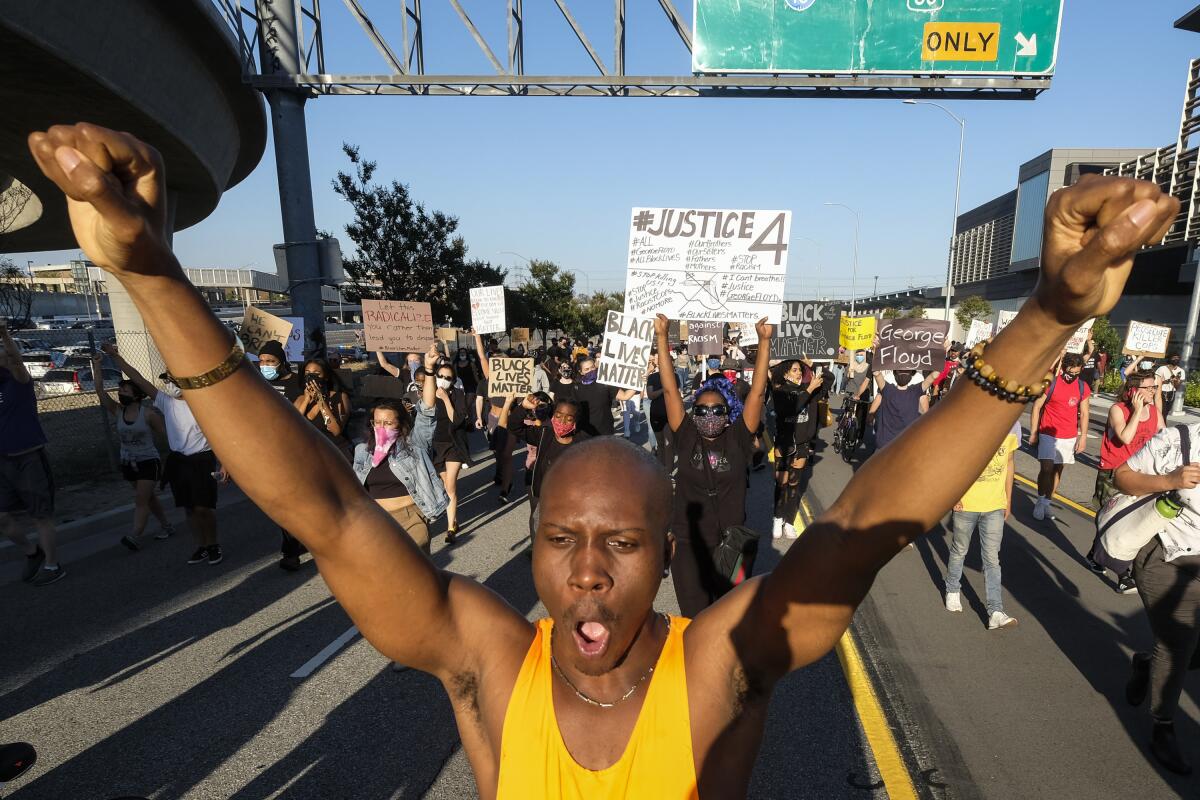More unlearned lessons from the LAPD

- Share via
The simple take-away from the independent report released Wednesday on the LAPD’s response to last year’s George Floyd protests is that the department was unprepared, its officers inadequately trained and its command staff incapable of communicating clear and consistent orders.
But that was immediately evident on the ground during the demonstrations that took place in Los Angeles after the Memorial Day killing of Floyd in Minneapolis. Confusion reigned as peaceful protesters were needlessly injured by hard foam rounds fired by police officers, who in turn felt abandoned by their superiors, or at least left to interpret chaotic and often conflicting orders on their own.
The question is why. How is it that the Los Angeles Police Department failed to learn from disastrous crowd-control failures during the 2000 Democratic National Convention, the 2007 MacArthur Park breakdown, the 2011 Occupy LA demonstrations, and on and on?
It’s because of memory lapse and leadership failure.
The report doesn’t put it quite that way, but the diagnosis is there all the same. The LAPD has been through numerous catastrophes and resulting course corrections that may make it the nation’s most reformed police organization, yet it has a bad habit of forgetting its lessons — to the detriment of both public safety and officer morale.
The report lays some blame on the retirement of many senior officers and command staff who took their skills and knowledge with them without passing them on to the next generation of recruits.
But the problem is also in remaining commanders who are afraid of their own shadows because they perceive too little support from Chief Michel Moore and too little faith from the Police Commission and elected leaders, who they believe don’t understand their work and will sell them out at a moment’s notice.
“The Department culture inhibits those in a position to make decisions as they are either afraid to use their best judgment or paralyzed by concerns that they will be second-guessed by their superiors or fear ‘becoming the story,’” according to the report.
The fear of “becoming the story” stands to reason, given the nationwide anti-police sentiment that grew more pronounced after the Floyd killing. Mayor Eric Garcetti and many members of the City Council were quick to blame police and divert resources to fend off criticism of themselves at the height of “defund the police” rhetoric over the summer.
In fact, a well-planned, thoughtful and strategic reallocation of resources from police to other services may well be warranted, especially in cases in which police have been tasked with work that even they contend is inappropriate for them, such as responding to mental health or substance use emergencies.
Yet contrary to those who argue that American policing is itself irredeemable and unreformable, we will still need police, so we need officers to be properly trained, staffed and led.
In the absence of adequate policing, one real-world alternative may look something like the Jan. 6 invasion of the U.S. Capitol. Some in that mob were bent on overthrowing the government and others were doubtless just angry and deluded Trump supporters who may have intended to obey all laws as they exercised their constitutional rights to express themselves. They were met by an ill-prepared, outnumbered and poorly informed police force whose members had little time to distinguish criminals from protesters as they ushered lawmakers to safety and perhaps averted a successful insurrection. Actual order was restored only on the late arrival of National Guard troops. The lack of proper intelligence, staffing and support from the top nearly proved fatal to democracy.
National Guard troops were ultimately called in Los Angeles, too, during the summer protests, but that’s no alternative to professional policing. Troops can’t do what police were tasked with doing: simultaneously preventing injury and destruction while protecting the lawful rights of peaceful protesters — and trying to distinguish between those to protect and those who would do harm. Their job was made more difficult by communication and command failures.
Although the movement to abolish police polls poorly, voices in support of abolition are loud. That makes it all the more incumbent on the mayor, the City Council and top police officials to ensure that they are building and supporting a department that learns from past mistakes. As the March 10 report shows, there are now even more to learn from.
More to Read
A cure for the common opinion
Get thought-provoking perspectives with our weekly newsletter.
You may occasionally receive promotional content from the Los Angeles Times.









